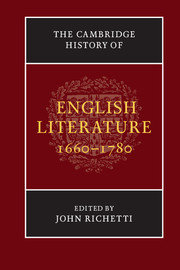Book contents
- Frontmatter
- Introduction
- PART I LITERARY PRODUCTION AND DISSEMINATION: CHANGING AUDIENCES AND EMERGING MEDIA
- PART II LITERARY GENRES: ADAPTATION AND REFORMATION
- PART III LITERATURE AND INTELLECTUAL LIFE: THE PRODUCTION AND TRANSMISSION OF CULTURE
- PART IV LITERATURE AND SOCIAL AND INSTITUTIONAL CHANGE
- PART V LITERARY GENRES: TRANSFORMATION AND NEW FORMS OF EXPRESSIVENESS
- 24 Personal letters
- 25 Diary and autobiography
- 26 The Gothic novel
- 27 Eighteenth-century travel literature
- 28 Women novelists 1740s–1780s
- 29 Burke and the uses of eloquence: political prose in the 1770s and 1780s
- PART VI CONCLUSION
- Chronology
- Bibliographies
- Index
- References
29 - Burke and the uses of eloquence: political prose in the 1770s and 1780s
from PART V - LITERARY GENRES: TRANSFORMATION AND NEW FORMS OF EXPRESSIVENESS
Published online by Cambridge University Press: 28 March 2008
- Frontmatter
- Introduction
- PART I LITERARY PRODUCTION AND DISSEMINATION: CHANGING AUDIENCES AND EMERGING MEDIA
- PART II LITERARY GENRES: ADAPTATION AND REFORMATION
- PART III LITERATURE AND INTELLECTUAL LIFE: THE PRODUCTION AND TRANSMISSION OF CULTURE
- PART IV LITERATURE AND SOCIAL AND INSTITUTIONAL CHANGE
- PART V LITERARY GENRES: TRANSFORMATION AND NEW FORMS OF EXPRESSIVENESS
- 24 Personal letters
- 25 Diary and autobiography
- 26 The Gothic novel
- 27 Eighteenth-century travel literature
- 28 Women novelists 1740s–1780s
- 29 Burke and the uses of eloquence: political prose in the 1770s and 1780s
- PART VI CONCLUSION
- Chronology
- Bibliographies
- Index
- References
Summary
The accession of George III to the throne of Great Britain in 1760 inaugurated a tumultuous new era in the country's politics. A succession of political crises agitated the nation, from the Wilkite disturbances of the 1760s and the American War of Independence to the impeachment of Warren Hastings and the ideological challenge of the French Revolution. The Wilkite controversy was sparked by the government's attempts to prosecute and silence John Wilkes, a radical member of parliament who had dared, in his newspaper The North Briton, to criticise the king directly in print. The political campaign against Hastings was motivated by allegations that, as head of the East India Company, he had grossly abused his position of power, enriching himself and his underlings at the expense of the people of India.
These political struggles inspired a formidable literature of political controversy. In the press, such eminent writers as Samuel Johnson, the pseudonymous Junius, Thomas Paine, Mary Wollstonecraft and William Godwin (among many others) placed their literary talents in the service of political polemic. In parliament the issues of the day elicited from members of both Houses speeches of such distinction that the latter part of the eighteenth century has come to be called the golden age of British parliamentary and forensic oratory. Opposition members, in particular, acquired a reputation for oratorical brilliance, most notably Edmund Burke, Charles James Fox and Richard Brinsley Sheridan. But in his mastery of contemporary political eloquence, Burke was widely conceded to be primus inter pares. No one else dominated quite like him all the available avenues and modes of political discourse, both in the press and in parliament.
- Type
- Chapter
- Information
- The Cambridge History of English Literature, 1660–1780 , pp. 768 - 794Publisher: Cambridge University PressPrint publication year: 2005



